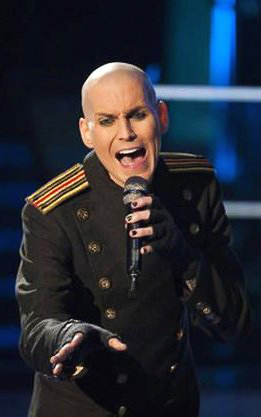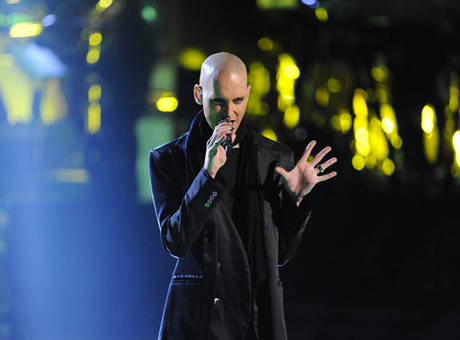
Tony Vincent was one of “The Voice’s” standout performers in season two due to his impressive vocal skills and showmanship. (Photo provided by Tony Vincent)
By: Jacob Elyachar
If you have not read part one of our conversation, click here: https://www.jakes-take.com/2012/10/02/a-conversation-with-tony-vincent-part-one
After years of rocking out Broadway and the West End with the casts of RENT, Jesus Christ Superstar, We Will Rock You and American Idiot: the Musical, Tony Vincent finally received the chance to continue his pop star dreams after he delivered an show-stopping rendition of Queen’s “We Are The Champions” that impressed Grammy Winner Cee Lo Green and was enlisted to join the superstar’s team on the second season of The Voice.
In part two of our conversation, Tony talks in-depth about his experience on the NBC show and his latest album: In My Head.
Jacob Elyachar: What made you transition back from theater to music and how did that result in your audition for The Voice?
Tony Vincent: After American Idiot, I had such a desire to take my music seriously again and to get myself focused knowing how important the visual is and how important television is to a success of a solo artist. I had a lot of respect for the way The Voice handled their audition process and that really spoke volumes to me because it is truly about the voice and now that I was a part of it, I really see the care that even the production team from the highest level down to the people who were runners at the show, they really care about presenting this show and the artists in the best way that they possibly can.
I just felt that it was the most valuable option to break out of the theater paradigm because I had been doing Broadway for 14 years at that point even though I was writing and doing my own music. People still thought that I was a theater guy and they did not know I did a record and success before hand and I thought the Voice was really the only option for me to show in a positive light what I could be as an artist. I did not know that I was going to be on a team and I felt strong enough that this vehicle (television) was a crucial element to the next step of my career as a musician.
JE: What were some of your friends and family’s reaction about your auditioning for the Voice?
TV: I have been really fortunate that I have strong support from my family. I have a wife (Aspen) that really believes in what I do and we both have such respect for each other’s talent, I don’t think we would married if we did not respect each other and we both care about our craft whether it is on-stage in a theater atmosphere or as a singer-songwriter performing in a studio or performing material on stage. It just felt like the right thing to do for our family and we needed to change things up and I knew that if I had an option to not perform eight times a week on Broadway, I wanted to take the chance and have a go at it.
JE: You had the opportunity to be mentored by both Cee Lo and Babyface during the Battle Rounds. What was that experience like?
TV: Before I knew Babyface was going to be the guest mentor, I had questions running in my head of “Who’s Cee Lo going to choose? Am I even going to know this person?” Because so many of my musical influences go far back. I don’t always have my finger on the pulse of what is going on in the pop world and I was concerned that I was going to walk through this room and not know who this artist was that could be selling millions of records for example.
Fortunately, that was not the case because Babyface was a huge producer, solo artist and songwriter during my early college days and late high school days. So it was actually really refreshing to know that I was paired with him.
Cee Lo and I became very tight on the show and off-camera. I think that was something that the network did not want to have happened because that is not the goal. The goal is to have a coach and teacher/student relationship. I have been through multiple record deals and had some radio success and we were talking like we were comrades. We spoke the same language and talked the business, we had been there (him to a much greater extent globally) but nonetheless the language is still the same and it is something that the network did not hold in a very positive light. I thought that Cee Lo was getting memos of “You and Tony Vincent need to show some distance. ”
There was a similar thing with Babyface. There was a clip that I saw afterwards when he was interviewed one-on-one with the camera and they asked him what he thought of me and he answered: “I don’t know what to tell you. The guy is a pro and I cannot give him any advice. He does what he does and he should not change anything.” That was probably not what NBC wanted to hear (laughs) but it is so humbling to hear positive comments from an iconic artist like him.
JE: Let’s talk about the live shows. You had a busy week between the birth of your daughter and performing on the show, what was it like riding on that emotional roller coaster?
TV: There was always the risk that I would be performing on the show while Aspen went into labor. We were really fortunate that it did not happen and I was not scheduled to perform that Monday night. Half of my team was going to be performing that night while I was going to perform on next Monday and the timing truly could not have been better.
I am really good about compartmentalizing and treating my family as one thing and the show or whatever my job as a secondary thing. Once the baby was born, it was a lot easier to know that everything was fine and everyone was healthy and to do the gig.

Tony Vincent’s haunting cover of “Sweet Dreams (Are Made of This)” that left a lasting impression on viewers. (Photo provided by Tony Vincent)
JE: When Carson revealed that you were in Cee Lo’s Bottom Two, what was going through your mind when you performed your “Last Chance” song: ““Sweet Dreams (Are Made of This)?”)
TV: What a lot of the show’s fans do not know is that the contestants do not choose the material that we sing. So we maybe performing a song that is incredibly wrong for us and we would have never would have chosen that song in 10 million lives. However, I did have a chance to pick two songs for the “Sing-Off” type of situations and “Sweet Dreams” was one of those songs.
Even though that was my last performance on the series, it was a performance to this day that I am incredibly proud of and it definitely represented what I do on stage as a solo artist. Everything about that performance was true to who I am as an artist and I left with my head held up very, very high.
JE: Let’s talk about your EP: “In My Head.” What was the recording process like compared to your previous recording sessions?
TV: This was the first time that I actually worked only with one other musician. I would say that 85-percent of the recording of this album was done in my recording studio. Technology has come such a long way and you could pretty much do everything what’s called “in the box.” It means is that it never has to leave your computer. You can record guitars directly into computer or audio-interface until the end product is done, it stays in there including all of your effects and all of your edits that you’ve made while recording your music. Plus, you are dealing with waveforms and that is very different from working with analog tape.
The other musician that I mentioned before, he lives in Gothenburg, Sweden and we utilized Dropbox extensively in this project. We only met with each other I think for a maximum of 12 days before The Voice happened and that’s when we started to record this EP. Obviously, that show took up so much time. Even though I was traveling with a small recording set-up, a lot of what I wanted to do could not be done until I was back home. After I put that experience behind me and checked that box off my list, I refocused and realigned my vision to making this a priority but I think both of those things were the biggest difference in this recording than my previous work.
JE: Who are your dream collaborators?
TV: Nigel Godrich is an amazing producer. He has done bands including Radiohead and U2. Another dream collaborator would be Mike “Spike” Stent, who is a really amazing mixer, producer and engineer for Madonna and Depeche Mode. Songwriter-wise, I would really like to collaborate with Roland Orzabal, the lead singer-songwriter from Tears for Fears, is a guy that I really want to hook-up with. I know Curt Smith, the bass player and the other half of Tears for Fears, so Roland and I might have the potential to work together in time.
JE: If you had the chance to meet with aspiring performers, what would be your advice to them?
TV: Surround yourself with people you can always learn something from. Always work with people that are better at their craft than you are. Stuff that you can glean and see them working in their own environment to figure out what their methods of working are, they may work for you or they may not, but at least it gives you an option to see your craft in a different way.
Feel out what people do and see what’s comfortable with you but always continue to remain challenged whether it is looking at other artists or actors and what they do behind the scenes before they actually perform (if you have that opportunity) and get involved. Plus, always continue to perform no matter what or where the activity is: local theater, regional theater, local clubs or coffee shops. Continue to play the guitar or your instrument and always continue to progress or otherwise you will fail.
For more information about Tony, visit his website: http://www.tonyvincent.com/pages/latest_news/




